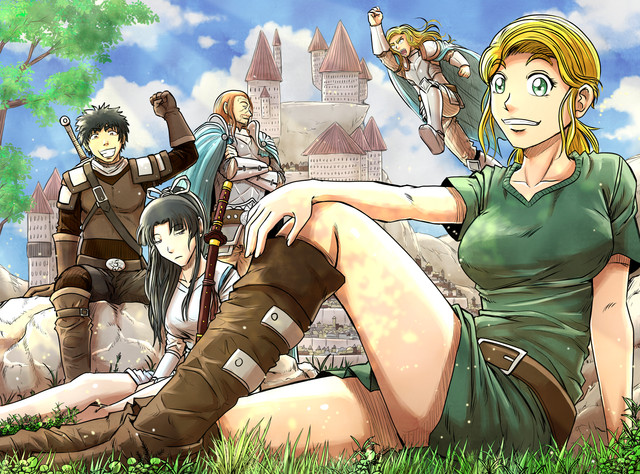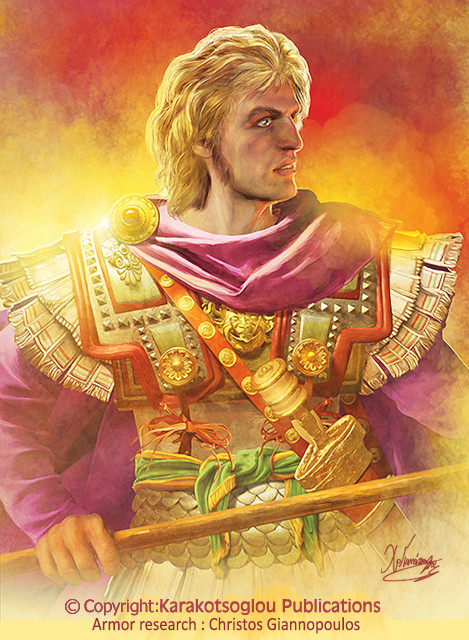HOME | DD
 artrobot9000 — Julius Caesar
artrobot9000 — Julius Caesar

Published: 2009-12-07 04:43:36 +0000 UTC; Views: 2428; Favourites: 25; Downloads: 23
Redirect to original
Description
Continuing my series of prints for Real life superheroes. Hands down the greatest conquer for simply being the real life Dr. Doom. Say what you want about his morality but Rome was better in his rule than the Republic.Related content
Comments: 5

Technically speaking, Rome was still a Republic under Julius Caesar. When he was assassinated, he had taken the title "Dictator for Life". The title of Dictator was a constitutional office within the Roman Republic, but it was only used in times of crisis and only for a short period of time. Caesar's alteration of the title struck at Roman tradition and lead to his assassination, but Caesar still ruled through a republican style.
Rome would not become an Empire until Caesar's nephew, Octavius aka Augustus, defeated Mark Anthony at Actium around 28 BCE. He then took the title "Princips" or first citizen, which was not a republican title. Hence the fact that Augustus is Rome's first Emperor.
👍: 0 ⏩: 1

Duly noted. Thanks for the info but it still doesn't change the fact started the process towards imperialism in Rome or that he had his own costume and fought in battles when his soldiers needed to rally for victory.
I have plans for Octavius as well. He accomplished what Christ, Buddha, or any other person in history never accomplished. The Pax Romana I think it is 200 years of peace. I could be wrong on that one, but even one lifetime is an accomplishment considering we can't go ten years without one war.
👍: 0 ⏩: 1

Dealing with Augustus and the "Pax Romana" might be interesting to see... partially because the 200 years of peace and absence of corruption is only an external image.
If you study Roman history closely, you'll find that Rome faced many wars and internal corruption during the supposed Roman Peace, some occuring simoultaneously. In fact the 1st Century historian Tacitus is often quoted, "Rome builds a desert. And calls it peace."
👍: 0 ⏩: 1

Never said it was a good peace just peace in the empire. As for the wars they were mostly border skirmishes as far as I know. I'm no expert though. You seem pretty adept at this though.
Again it just isn't as cool to say the Pax Romana was peace with conditions.
👍: 0 ⏩: 1

I do enjoy a lot of Roman history. And the wars were not border skirmishes and not all of them were in Rome's favor. I've included a list of the largest campaigns of the "Pax Romana" period if you have any interest.
In 9 CE (late in Augustus's reign) 3 legions were annihilated in the Teutoburg Wald by Germanic tribesmen loyal to Arminius. Before that battle, the Roman Army functioned with 30 legions. After the defeat, Rome never replaced those lost legions and they maintained an army of only 27 legions. And given that a Roman legion in the 1st Century was about 100,000 strong, to lose three in their entirity was a massive battle.
In 60 CE a small celtic tribe known as the Iceni rebelled against Roman rule in Britainia. They gathered other tribes to their banner, defeated one Roman legion in battle and burned what is now London to the ground. They held out for a year before finally being defeated.
In 67 CE the Jews launched an even larger uprising against Roman rule. They held out for seven years before they were defeated. In the course of this rebellion, the Temple of Herod was burned to the ground by Roman soldiers. Only the wailing wall remains today.
From 68 CE to 69 CE, Rome was hit by a massive civil war. Nero had committed suicide in 68 CE with no hiers. Four Generals would then claim the throne over the course of a year. It is remembered as the year of four Emperors and ended when Vespasian finally captured Rome.
There were others, but most of the others were more along the lines of border skirmishes, or in the case of Trajan's conquests, one sided and short lived (Hadrian largely abandoned all of Trajan's conquests).
From what I've studied, what made the Pax Romana the Pax Romana had little to do with whether or not the Empire was at war, but whether or not the government was stable. The last years of the Republic were marked by strife as both Caesar and Pompey argued over who would dominate the Republic. With the exception of the civil war after Nero's death, such occurances did not happen during the Pax Romana. The government was stable and the Empire had more good leaders during the time period then bad ones.
👍: 0 ⏩: 0























